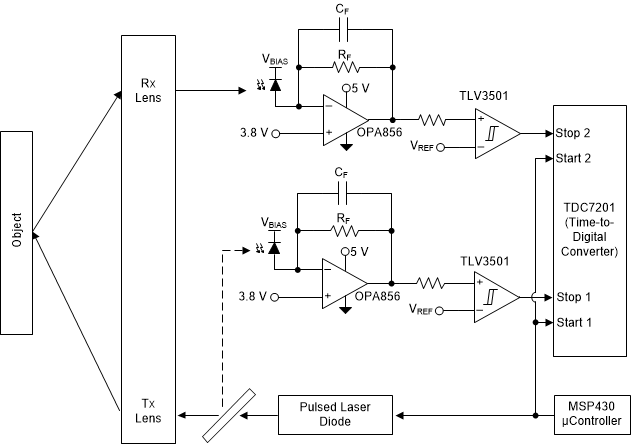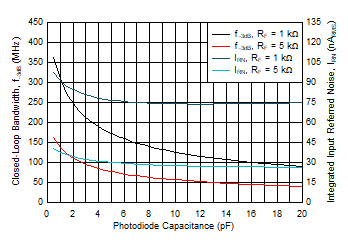SBOS623 October 2020 OPA856
PRODUCTION DATA
- 1 Features
- 2 Applications
- 3 Description
- 4 Revision History
- 5 Device Comparison Table
- 6 Pin Configuration and Functions
- 7 Specifications
- 8 Detailed Description
- 9 Application and Implementation
- 10Power Supply Recommendations
- 11Layout
- 12Device and Documentation Support
- 13Mechanical, Packaging, and Orderable Information
Package Options
Mechanical Data (Package|Pins)
- DSG|8
Thermal pad, mechanical data (Package|Pins)
- DSG|8
Orderable Information
3 Description
The OPA856 is a wideband, low-noise operational amplifier with bipolar inputs for wideband transimpedance and voltage amplifier applications. When the device is configured as a transimpedance amplifier (TIA), the 1.1-GHz gain bandwidth product (GBWP) enables high closed-loop bandwidths in low-capacitance photodiode applications.
The graph below shows the bandwidth and noise performance of the OPA856 as a function of the photodiode capacitance when the amplifier is configured as a TIA. The total noise is calculated along a bandwidth range extending from DC to the calculated frequency (f) on the left scale. The OPA856 package has a feedback pin (FB) that simplifies the feedback network connection between the input and the output.
The OPA856 is optimized to operate in optical time-of-flight (ToF) systems where the OPA856 is used with time-to-digital converters, such as the TDC7201. Use the OPA856 to drive a high-speed analog-to-digital converter (ADC) in high-resolution LIDAR systems with a differential output amplifier, such as the THS4541 or LMH5401.
| PART NUMBER(1) | PACKAGE | BODY SIZE (NOM) |
|---|---|---|
| OPA856 | WSON (8) | 2.00 mm × 2.00 mm |
 High-Speed
Time-of-Flight Receiver
High-Speed
Time-of-Flight Receiver Photodiode
Capacitance vs Bandwidth and Noise
Photodiode
Capacitance vs Bandwidth and Noise